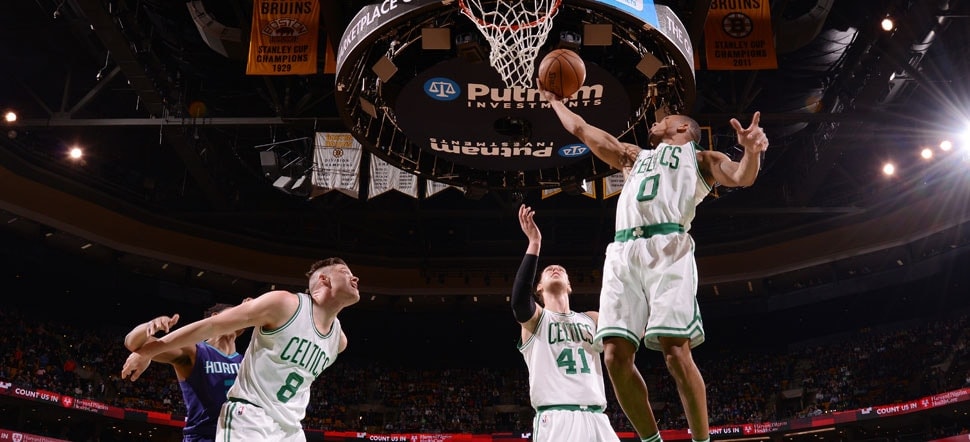addByline("Marc D'Amico", "Celtics.com", "Marc_DAmico");
MIAMI – The Boston Celtics just allowed the fledgling Miami Heat to shoot 52.2 percent from the field Sunday night and the C’s don’t have a big man averaging more than 6.4 rebounds per game.
The Boston Celtics are terrible at defending and rebounding, right? Wrong.
Very wrong.
In fact, the truth is at the other end of the spectrum.
When it comes to Boston’s defense and rebounding, it’s not all about what meets the eye, especially from a raw statistical standpoint. It’s about what’s really happening on the court. And what’s really happening on the court is drastic improvement in those two categories.
Take Sunday night, for instance. Yes, Miami shot 52.2 percent from the field, but it was only able to attempt 69 shots on the night – 21 fewer than Boston. That’s because the Celtics forced Miami into 23 turnovers. That’s great defense.
Boston has been on a steady and steep climb up the defensive rankings all season long, as Brad Stevens indicated Monday afternoon before practice at AmericanAirlines Arena.
“[Since] the Washington game (Nov. 9), I think I looked at our defensive numbers and we’re top-five in the league,” Stevens said. “So if you take those first seven games out… I’m kind of looking at the whole.”
Stevens hit the nail on the head. Boston ranked dead last in the league in defensive rating (112.3) through the first seven games of the season, including that matchup with Washington. Since that date, the Celtics rank fourth in the league in defensive rating (100.8).
That’s pretty darn good.
The rebounding numbers have been on a steady climb as well. The Celtics ranked last in the league in defensive rebound percentage (73.4 percent) through their first 18 games of the season. Over its last nine games, Boston has jumped all the way up to seventh in the league in defensive rebound percentage (76.8 percent).
That’s also pretty darn good.
Part of these improvements can be associated with the team getting healthier and healthier as the season has progressed. More importantly, however, the players have become more accustomed to the schemes that Stevens has implemented.
Rebounding is the most glaring area in which the Celtics have adjusted. Stevens has asked Boston’s big men to concentrate on boxing their men out more so than actually grabbing rebounds, allowing the guards to crash the glass.
“I need to get rebounds when I can,” said Al Horford, “but my priority is to box my man out and make sure we hold the other team to one shot.”
That’s a unique approach, and a substantial shift in Boston’s philosophy compared to previous seasons.
“We had Jared Sullinger last year, who did a good job of just rebounding by himself and creating space down there,” said Jae Crowder. “This year it’s more of a collective effort. Everybody’s in.”
Horford, who is grabbing a career-low average of 6.4 rebounds per game, has some experience with such a scheme. He played under similar instruction in Atlanta under Mike Budenholzer, and he recalled the challenges he faced when trying to adjust to such a game plan.
“At the beginning, it was a little frustrating for the bigs, because we were like, ‘Man, we want to get more rebounds. We’re not getting enough rebounds,’” Horford recollected. “I remember that Bud in Atlanta was like, ‘I don’t care if you get two rebounds. I just want you to box out and our guards will figure it out. We need them to be great at rebounding for us to be a good team.’
Horford gave context as to how massive an adjustment it was for him in Atlanta, and how massive an adjustment it must have been for the rest of his teammates this season.
“It took me about 10 games,” he recalled. “Because at the beginning, I remember me and Paul Millsap, we were like, ‘These guys are coming in here and stealing our rebounds. What’s going on?’ But then it’s all about the team. It’s not about you, right? It’s not about the numbers. You’re playing for something bigger.”
And by something bigger, Horford means something better: winning games.
The Celtics, at 15-12, have won more often than not this season despite the fact that they struggled out of the gates with their defense and with their rebounding.
Now they’re playing at an elite level in both of those categories, which means their winning percentage should spike as the rest of the season wears on.

